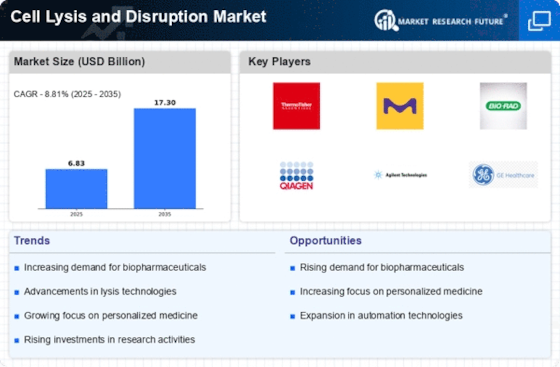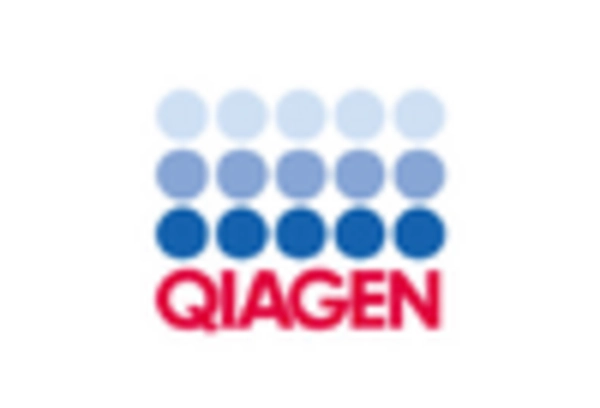-
REPORT PROLOGUE
-
MARKET INTRODUCTION
-
Definition
-
Scope of the Study
- Research Objective
- Assumptions
- Limitations
-
RESEARCH METHODOLOGY
-
Overview
-
Primary Research
-
Secondary Research
-
Market Size Estimation
-
MARKET DYNAMICS
-
Overview
-
Drivers
-
Restraints
-
Opportunities
-
MARKET FACTOR ANALYSIS
-
Porter’s Five Forces Analysis
- Bargaining Power of Suppliers
- Bargaining Power of Buyers
- Threat of New Entrants
- Threat of Substitutes
- Intensity of Rivalry
-
Value Chain Analysis
-
GLOBAL CELL LYSIS & DISRUPTION MARKET, BY TECHNIQUE
-
Overview
-
Reagent Based
-
Market Estimates & Forecast, by Region, 2020-2027
-
Market Estimates & Forecast, by Country, 2020-2027
-
Detergent
-
Market Estimates & Forecast, by Region, 2020-2027
-
Market Estimates & Forecast, by Country, 2020-2027
-
Enzymatic
-
Market Estimates & Forecast, by Region, 2020-2027
-
Market Estimates & Forecast, by Country, 2020-2027
-
Physical Disruption
-
Market Estimates & Forecast, by Region, 2020-2027
-
Market Estimates & Forecast, by Country, 2020-2027
-
Mechanical Homogenization
-
Market Estimates & Forecast, by Region, 2020-2027
-
Market Estimates & Forecast, by Country, 2020-2027
-
Ultrasonic Homogenization
-
Market Estimates & Forecast, by Region, 2020-2027
-
Market Estimates & Forecast, by Country, 2020-2027
-
Pressure Homogenization
-
Market Estimates & Forecast, by Region, 2020-2027
-
Market Estimates & Forecast, by Country, 2020-2027
-
Temperature Treatments
-
Market Estimates & Forecast, by Region, 2020-2027
-
Market Estimates & Forecast, by Country, 2020-2027
-
GLOBAL CELL LYSIS & DISRUPTION MARKET, BY PRODUCT
-
Overview
-
Consumables
-
Market Estimates & Forecast, by Region, 2020-2027
-
Market Estimates & Forecast, by Country, 2020-2027
-
Reagents and Kits
-
Market Estimates & Forecast, by Region, 2020-2027
-
Market Estimates & Forecast, by Country, 2020-2027
-
Beads
-
Market Estimates & Forecast, by Region, 2020-2027
-
Market Estimates & Forecast, by Country, 2020-2027
-
Disposables
-
Market Estimates & Forecast, by Region, 2020-2027
-
Market Estimates & Forecast, by Country, 2020-2027
-
Instruments
-
Market Estimates & Forecast, by Region, 2020-2027
-
Market Estimates & Forecast, by Country, 2020-2027
-
Sonicators
-
Market Estimates & Forecast, by Region, 2020-2027
-
Market Estimates & Forecast, by Country, 2020-2027
-
Homogenizers
-
Market Estimates & Forecast, by Region, 2020-2027
-
Market Estimates & Forecast, by Country, 2020-2027
-
French Press
-
Market Estimates & Forecast, by Region, 2020-2027
-
Market Estimates & Forecast, by Country, 2020-2027
-
Microfluidizer
-
Market Estimates & Forecast, by Region, 2020-2027
-
Market Estimates & Forecast, by Country, 2020-2027
-
Others
-
Market Estimates & Forecast, by Region, 2020-2027
-
Market Estimates & Forecast, by Country, 2020-2027
-
GLOBAL CELL LYSIS & DISRUPTION MARKET, BY CELL TYPE
-
Overview
-
Mammalian Cells
-
Market Estimates & Forecast, by Region, 2020-2027
-
Market Estimates & Forecast, by Country, 2020-2027
-
Microbial Cells
-
Market Estimates & Forecast, by Region, 2020-2027
-
Market Estimates & Forecast, by Country, 2020-2027
-
Others
-
Market Estimates & Forecast, by Region, 2020-2027
-
Market Estimates & Forecast, by Country, 2020-2027
-
GLOBAL CELL LYSIS & DISRUPTION MARKET, BY END USER
-
Overview
-
Research Laboratories and Institutes
-
Market Estimates & Forecast, by Region, 2020-2027
-
Market Estimates & Forecast, by Country, 2020-2027
-
Market Estimates & Forecast, by Region, 2020-2027
-
Market Estimates & Forecast, by Country, 2020-2027
-
Others
-
Market Estimates & Forecast, by Region, 2020-2027
-
Market Estimates & Forecast, by Country, 2020-2027
-
GLOBAL CELL LYSIS & DISRUPTION MARKET, BY REGION
-
Overview
-
Americas
- North America
- Latin America
-
Europe
- Western Europe
- Eastern Europe
-
Asia-Pacific
- Japan
- China
- India
- Australia
- South Korea
- Rest of Asia-Pacific
-
Middle East & Africa
- Middle East
- Africa
-
COMPANY LANDSCAPE
-
Overview
-
Competitive Analysis
-
Market Share Analysis
-
Major Growth Strategy in the Global Cell Lysis & Disruption Market
-
Competitive Benchmarking
-
Leading Players in terms of Number of Developments in the Global Cell Lysis & Disruption Market
-
Key developments and Growth Strategies
- New Product Launch/Service Deployment
- Merger & acquisitions
- Joint Ventures
-
Major Players Financial Matrix & Market Ratio
- Sales & Operating Income 2020
- Major Players R&D Expenditure 2020
-
Major Players Capital Market Ratio
-
COMPANY PROFILES
-
Thermo Fisher Scientific, Inc.
- Company Overview
- Product Type Overview
- Financial Overview
- Key Developments
- SWOT Analysis
- Key Strategies
-
Merck KGAA
- Company Overview
- Product Type Overview
- Financial Overview
- Key Developments
- SWOT Analysis
- Key Strategies
-
Bio-Rad Laboratories, Inc.
- Company Overview
- Product Type Overview
- Financial Overview
- Key Developments
- SWOT Analysis
- Key Strategies
-
Danaher Corporation
- Company Overview
- Product Type Overview
- Financial Overview
- Key Developments
- SWOT Analysis
- Key Strategies
-
Becton Dickinson & Company
- Company Overview
- Product Type Overview
- Financial Overview
- Key Developments
- SWOT Analysis
- Key Strategies
-
Cell Signaling Technology, Inc.
- Company Overview
- Product Type Overview
- Financial Overview
- Key Developments
- SWOT Analysis
- Key Strategies
-
Miltenyi Biotec
- Company Overview
- Product Type Overview
- Financial Overview
- Key Developments
- SWOT Analysis
- Key Strategies
-
F. Hoffmann–La Roche Ltd
- Company Overview
- Product Type Overview
- Financial Overview
- Key Developments
- SWOT Analysis
- Key Strategies
-
Qiagen NV
- Company Overview
- Product Type Overview
- Financial Overview
- Key Developments
- SWOT Analysis
- Key Strategies
-
Qsonica, LLC
- Company Overview
- Product Type Overview
- Financial Overview
- Key Developments
- SWOT Analysis
- Key Strategies
-
Others
-
APPENDIX
-
References
-
Related Reports
-
-
LIST OF TABLES
-
GLOBAL CELL LYSIS & DISRUPTION MARKET SYNOPSIS, 2020-2027
-
GLOBAL CELL LYSIS & DISRUPTION MARKET ESTIMATES & FORECAST, 2020-2027 (USD MILLION)
-
GLOBAL CELL LYSIS & DISRUPTION MARKET, BY TECHNIQUE, 2020-2027 (USD MILLION)
-
GLOBAL CELL LYSIS & DISRUPTION MARKET, BY PRODUCT, 2020-2027 (USD MILLION)
-
GLOBAL CELL LYSIS & DISRUPTION MARKET, BY CELL TYPE, 2020-2027 (USD MILLION)
-
GLOBAL CELL LYSIS & DISRUPTION MARKET, BY END USER, 2020-2027 (USD MILLION)
-
GLOBAL CELL LYSIS & DISRUPTION MARKET, BY REGION, 2020-2027 (USD MILLION)
-
NORTH AMERICA: CELL LYSIS & DISRUPTION MARKET, BY TECHNIQUE, 2020-2027 (USD MILLION)
-
NORTH AMERICA: CELL LYSIS & DISRUPTION MARKET, BY PRODUCT, 2020-2027 (USD MILLION)
-
NORTH AMERICA: CELL LYSIS & DISRUPTION MARKET, BY CELL TYPE, 2020-2027 (USD MILLION)
-
NORTH AMERICA: CELL LYSIS & DISRUPTION MARKET, BY END USER, 2020-2027 (USD MILLION)
-
US: CELL LYSIS & DISRUPTION MARKET, BY TECHNIQUE, 2020-2027 (USD MILLION)
-
US: CELL LYSIS & DISRUPTION MARKET, BY PRODUCT, 2020-2027 (USD MILLION)
-
US: CELL LYSIS & DISRUPTION MARKET, BY CELL TYPE, 2020-2027 (USD MILLION)
-
US: CELL LYSIS & DISRUPTION MARKET, BY END USER, 2020-2027 (USD MILLION)
-
CANADA: CELL LYSIS & DISRUPTION MARKET, BY TECHNIQUE, 2020-2027 (USD MILLION)
-
CANADA: CELL LYSIS & DISRUPTION MARKET, BY PRODUCT, 2020-2027 (USD MILLION)
-
CANADA: CELL LYSIS & DISRUPTION MARKET, BY CELL TYPE, 2020-2027 (USD MILLION)
-
CANADA: CELL LYSIS & DISRUPTION MARKET, BY END USER, 2020-2027 (USD MILLION)
-
LATIN AMERICA: CELL LYSIS & DISRUPTION MARKET, BY TECHNIQUE, 2020-2027 (USD MILLION)
-
LATIN AMERICA: CELL LYSIS & DISRUPTION MARKET, BY PRODUCT, 2020-2027 (USD MILLION)
-
LATIN AMERICA: CELL LYSIS & DISRUPTION MARKET, BY CELL TYPE, 2020-2027 (USD MILLION)
-
LATIN AMERICA: CELL LYSIS & DISRUPTION MARKET, BY END USER, 2020-2027 (USD MILLION)
-
EUROPE: CELL LYSIS & DISRUPTION MARKET, BY TECHNIQUE, 2020-2027 (USD MILLION)
-
EUROPE: CELL LYSIS & DISRUPTION MARKET, BY PRODUCT, 2020-2027 (USD MILLION)
-
EUROPE: CELL LYSIS & DISRUPTION MARKET, BY CELL TYPE, 2020-2027 (USD MILLION)
-
EUROPE: CELL LYSIS & DISRUPTION MARKET, BY END USER, 2020-2027 (USD MILLION)
-
WESTERN EUROPE: CELL LYSIS & DISRUPTION MARKET, BY TECHNIQUE, 2020-2027 (USD MILLION)
-
WESTERN EUROPE: CELL LYSIS & DISRUPTION MARKET, BY PRODUCT, 2020-2027 (USD MILLION)
-
WESTERN EUROPE: CELL LYSIS & DISRUPTION MARKET, BY CELL TYPE, 2020-2027 (USD MILLION)
-
WESTERN EUROPE: CELL LYSIS & DISRUPTION MARKET, BY END USER, 2020-2027 (USD MILLION)
-
EASTERN EUROPE: CELL LYSIS & DISRUPTION MARKET, BY TECHNIQUE, 2020-2027 (USD MILLION)
-
EASTERN EUROPE: CELL LYSIS & DISRUPTION MARKET, BY PRODUCT, 2020-2027 (USD MILLION)
-
EASTERN EUROPE: CELL LYSIS & DISRUPTION MARKET, BY CELL TYPE, 2020-2027 (USD MILLION)
-
EASTERN EUROPE: CELL LYSIS & DISRUPTION MARKET, BY END USER, 2020-2027 (USD MILLION)
-
ASIA-PACIFIC: CELL LYSIS & DISRUPTION MARKET, BY TECHNIQUE, 2020-2027 (USD MILLION)
-
ASIA-PACIFIC: CELL LYSIS & DISRUPTION MARKET, BY PRODUCT, 2020-2027 (USD MILLION)
-
ASIA-PACIFIC: CELL LYSIS & DISRUPTION MARKET, BY CELL TYPE, 2020-2027 (USD MILLION)
-
ASIA-PACIFIC: CELL LYSIS & DISRUPTION MARKET, BY END USER, 2020-2027 (USD MILLION)
-
MIDDLE EAST & AFRICA: CELL LYSIS & DISRUPTION MARKET, BY TECHNIQUE, 2020-2027 (USD MILLION)
-
MIDDLE EAST & AFRICA: CELL LYSIS & DISRUPTION MARKET, BY PRODUCT, 2020-2027 (USD MILLION)
-
MIDDLE EAST & AFRICA: CELL LYSIS & DISRUPTION MARKET, BY CELL TYPE, 2020-2027 (USD MILLION)
-
MIDDLE EAST & AFRICA: CELL LYSIS & DISRUPTION MARKET, BY END USER, 2020-2027 (USD MILLION)
-
-
LIST OF FIGURES
-
RESEARCH PROCES
-
MARKET STRUCTURE FOR THE GLOBAL CELL LYSIS & DISRUPTION MARKET
-
MARKET DYNAMICS FOR THE GLOBAL CELL LYSIS & DISRUPTION MARKET
-
GLOBAL CELL LYSIS & DISRUPTION MARKET SHARE, BY TECHNIQUE, 2020 (%)
-
GLOBAL CELL LYSIS & DISRUPTION MARKET SHARE, BY PRODUCT, 2020 (%)
-
GLOBAL CELL LYSIS & DISRUPTION MARKET SHARE, BY CELL TYPE, 2020 (%)
-
GLOBAL CELL LYSIS & DISRUPTION MARKET SHARE, BY END USER, 2020 (%)
-
GLOBAL CELL LYSIS & DISRUPTION MARKET SHARE, BY REGION, 2020 (%)
-
AMERICAS: CELL LYSIS & DISRUPTION MARKET SHARE BY REGION, 2020 (%)
-
NORTH AMERICA: CELL LYSIS & DISRUPTION MARKET SHARE, BY COUNTRY, 2020 (%)
-
EUROPE: CELL LYSIS & DISRUPTION MARKET SHARE, BY REGION, 2020 (%)
-
WESTERN EUROPE: CELL LYSIS & DISRUPTION MARKET SHARE, BY COUNTRY, 2020 (%)
-
ASIA-PACIFIC: CELL LYSIS & DISRUPTION MARKET SHARE, BY COUNTRY, 2020 (%)
-
MIDDLE EAST & AFRICA: CELL LYSIS & DISRUPTION MARKET SHARE, BY COUNTRY, 2020 (%)
-
GLOBAL CELL LYSIS & DISRUPTION MARKET: COMPANY SHARE ANALYSIS, 2020 (%)
-
THERMO FISHER SCIENTIFIC, INC.: KEY FINANCIALS
-
THERMO FISHER SCIENTIFIC, INC.: SEGMENTAL REVENUE
-
THERMO FISHER SCIENTIFIC, INC.: REGIONAL REVENUE
-
MERCK KGAA: KEY FINANCIALS
-
MERCK KGAA: SEGMENTAL REVENUE
-
MERCK KGAA: REGIONAL REVENUE
-
BIO-RAD LABORATORIES, INC.: KEY FINANCIALS
-
BIO-RAD LABORATORIES, INC.: SEGMENTAL REVENUES
-
BIO-RAD LABORATORIES, INC.: REGIONAL REVENUE
-
DANAHER CORPORATION: KEY FINANCIALS
-
DANAHER CORPORATION: SEGMENTAL REVENUE
-
DANAHER CORPORATION: REGIONAL REVENUE
-
BECTON DICKINSON & COMPANY: KEY FINANCIALS
-
BECTON DICKINSON & COMPANY: SEGMENTAL REVENUE
-
BECTON DICKINSON & COMPANY: REGIONAL REVENUE
-
CELL SIGNALING TECHNOLOGY, INC.: KEY FINANCIALS
-
CELL SIGNALING TECHNOLOGY, INC.: SEGMENTAL REVENUE
-
CELL SIGNALING TECHNOLOGY, INC.: REGIONAL REVENUE
-
MILTENYI BIOTEC: KEY FINANCIALS
-
MILTENYI BIOTEC: SEGMENTAL REVENUE
-
MILTENYI BIOTEC: REGIONAL REVENUE
-
F. HOFFMANN–LA ROCHE LTD: KEY FINANCIALS
-
F. HOFFMANN–LA ROCHE LTD: SEGMENTAL REVENUE
-
F. HOFFMANN–LA ROCHE LTD: REGIONAL REVENUE
-
QIAGEN NV: KEY FINANCIALS
-
QIAGEN NV: SEGMENTAL REVENUE
-
QIAGEN NV: REGIONAL REVENUE
-
QSONICA, LLC: KEY FINANCIALS
-
QSONICA, LLC: SEGMENTAL REVENUE
-
QSONICA, LLC: REGIONAL REVENUE


















Leave a Comment